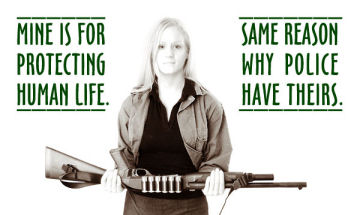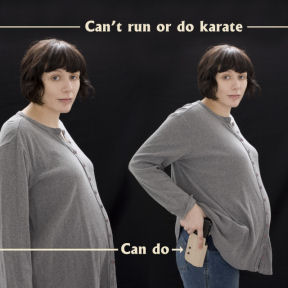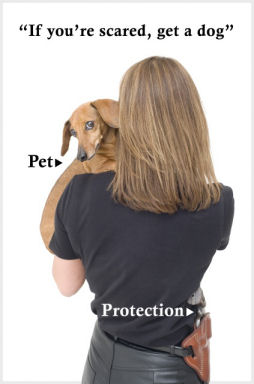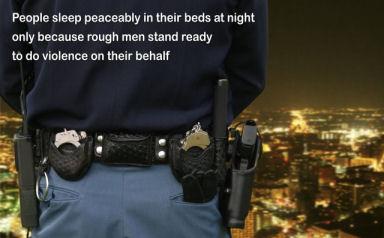For the most part, this Cornered Cat website is intended for people who have already decided that firearms are something they are interested in, or for people who are in relationships with gun owners. Although I am very enthusiastic about educating newcomers, I’m not really interested in trying to convince people who don’t trust themselves around firearms to do anything they are uncomfortable with or unwilling to do. I believe the readers are adult, responsible human beings who are perfectly capable of making their own decisions about what they are — and are not — willing to do in self defense.
Nevertheless, I’ve recently had a spate of people asking me, “Why a gun? Why don’t you use some other, less violent, less lethal way to defend yourself?” These are good questions, and they deserve an answer.

It’s surprising to me, the number of people who think the purpose of carrying a gun is to “kill someone.” Most emphatically, it is not. Firearms are indeed useful for defense, but their usefulness does not happen simply because they can be lethal. Rather, they are useful because, to date, they are the most effective (and perhaps the only reliable) means for stopping a determined criminal attack before an innocent person is gravely injured, maimed for life, or killed.
For those who would rather use a less-lethal means of defense, I absolutely support your right to choose whatever tools or techniques you feel you need in order to protect yourself. Kudos to you for your determination to stay safe! Like you, I see that awareness, avoidance, de-escalation, and deterrence are the absolute best first line of defense. Whenever possible, the smart choice is to avoid situations which may make physical self defense necessary. Stay away from dangerous people and places. Pay attention to what is happening around you. Listen to the little voice that tells you something might be wrong, and get away before trouble starts. Do not escalate unpleasant encounters, but rather use your calm, confident demeanor to remove yourself from the situation as quickly as possible. Use whatever means you can contrive to convince the potential attacker that it is not worth the effort it will take to assault you. Learn the body language of empowerment and capability and use it. If you do get attacked and cannot defend yourself physically, remember that negotiation, misdirection, and outright lying in order to escape are all perfectly acceptable. If the criminal just wants stuff, give him stuff; stuff is less valuable than human lives. These simple, intelligent precautions can save you from a world of grief.
But when all that fails, what’s left? Do we ignore the danger from a brutal, determined, vicious assailant simply because we are afraid of the consequences of an effective defense? Do we choose not to defend ourselves to the uttermost because our best means of defense may result in the criminal’s death?

Here is what it boils down to, for me. If the attacker pushes the incident clear to the desperate place where someone — either the intended victim herself, or the arriving officers who are armed with deadly weapons — must make a choice between saving either the attacker’s life or the victim’s, I really believe that the intended victim’s innocent life should be the one that is spared, without question and without hesitation.
If a criminal attacks me without provocation, why should he — the aggressor, the malefactor, the bad actor — get to choose which one of us survives our encounter? In initiating such extreme violence, the criminal has already chosen that at least one person will die or be seriously injured as a result of his acts. The law allows for lethal self-defense because wise people through the ages have recognized that in some circumstances, literally the only choice left for another person to make is whether the intended victim or the person who attacked her will be the one to survive.
There is something else, something perhaps more fundamental. I say more fundamental because at this point, those who are skeptical about the necessity of using lethal defensive force may be thinking, “Yes, but isn’t there some other way?” And the answer is, not really. Not when innocent life hangs in the balance, and the attacker is both aggressive and determined.
If there were another way, law enforcement officers would not carry firearms at all. They certainly have other tools available to them; nearly all officers these days are armed with bare-hands skills, batons, pepper spray, Tasers, and less-lethal ammunition such as pepperballs and beanbags for their shotguns. Police officers have radios and backup officers ready to rush to their aid on a moment’s notice.
So alternative tools exist. And every law enforcement agency in America has a detailed use-of-force policy which makes it very, very clear to its employees that lethal force is the absolute last resort, to be used only in desperate situations where all other means of protection have failed or are clearly unavailable. Those policies usually make it clear that neither the law enforcement management nor its lawyers are exactly happy about having lethal force readily available to ordinary cops on the street. And yet … ordinary cops still carry firearms. Why do that, when so many other tools exist, and when using lethal force is so often a public-relations nightmare? Simply because experienced law enforcement personnel recognize that in the most dire and desperate of circumstances, only a firearm can reliably stop a determined and aggressive criminal.
So even though those less-lethal options do exist, and are used by preference nearly all of the time, the vast majority of departments absolutely mandate that backup (at least one other officer) must be present before a dangerous felon may be engaged with any of these less-lethal tools. And what is the backup officer suppposed to be doing? He or she is supposed to be posted in a defensible position (ideally behind cover) with the firearm in hand and the muzzle oriented toward the threat. The backup officer is prepared to use the firearm to save the other officer’s life, just in case the less-lethal method of dealing with the dangerous criminal does not work.
To save a life in case the less-lethal method of dealing with the criminal does not work. Ponder that thought for a long moment, please.

Even with all the advantages they have, even with at least one other officer already present on the scene, even with immediate radio contact with the 911 operator and police dispatcher, law enforcement officers still do not trust their own lives to less-lethal methods for dealing with a dangerous, belligerent criminal unless they have someone armed and ready to defend them if less-lethal methods fail. The individual officer is expected to delay contact with a truly dangerous criminal until at least one backup officer is on the scene and prepared to shoot if necessary.
Of course, what the police need to do in order to fulfill their jobs, I do not need to do as a private citizen. I do not need to seek out wrongdoers and bring them to justice. That’s not my job. As a private person, if I am interacting with a criminal at all, it is because the criminal brought the fight to me and attacked me without provocation. The criminal gets the element of surprise, and he chooses when, where, and whether to attack me. I may get to choose my response, but I don’t get to choose the time or the place. And I do not get to choose whether or not the conflict is “worth” a human life; the attacker does.
Whatever form my response to the attack might take, it has to happen right now and it simply will not wait for someone else to arrive on scene. Unlike the typical police officer dealing with a criminal, the ordinary citizen does not have the luxury of waiting to initiate contact until the time is right. The criminal attacks with little or no warning. The odds are already stacked against the intended victim, or the criminal would not have chosen that time and that place to attack her.
Because ordinary people do not seek out criminals, our chances of being criminally assaulted are significantly lower than those faced by a police officer. But by the same token, if we are physically assaulted, it is relatively more likely that the criminal will intend to maim or kill (rather than to simply escape), and very much less likely that we will have anyone else standing by prepared to protect us if our first response fails. Whatever defense I choose to carry with me is very likely the only defense I will have available when the conflict begins, and perhaps for some time thereafter.
So. I’m not a police officer. I’m just a regular woman, and there’s only one of me. I’ve had some martial arts training, just enough for me to realize that I’m a bit more breakable than the average, and just enough to learn that the height, strength, and weight advantage enjoyed by a typical male is considerable even with good training.
So what are the less-lethal options that I’ve rejected?

Because of severe asthma, I cannot safely use pepper spray. If I could, I would probably carry it in addition to my firearm. (Read more about pepper spray here.)
I’ve seen the “stun guns” marketed for ordinary people and they are a joke, only slightly more painful than touching your tongue to a 9-volt battery. They do not work at all unless you are in physical contact with the assailant (a very bad place to be!), and their primary effect is to annoy. I don’t know about you, but I don’t think it is a good idea to annoy dangerous criminals.
Tasers are still somewhat bulkier than most defensive firearms, and have the added drawback that you only get a single shot. This problem becomes much more significant when you realize that Tasers are also prohibitively expensive to practice with. If you miss, you are reduced to scrabbling hand to hand with an armed attacker or with an assailant who believed he could take you bare handed in the first place. 1 If that single shot from the Taser does hit, you have exactly thirty seconds to get so far away from the criminal that he cannot attack you again, because as soon as the current from the Taser shuts off, the event is over with no after-effects whatsoever. How far can you run in thirty seconds? Is it further than an enraged criminal can follow?
Knives, of course, are lethal force. By the way, so are many of the most effective empty hand martial arts techniques. An effective blow to the groin can literally kill a man, as can a strike to the chest (not a great strike point anyway), many nerve holds can kill, a kick to the knee cripples a man for life and can kill him from blood loss, an effective eye gouge blinds him for life if it does not kill him outright, a simple hip throw can break an assailant’s neck or back. The list goes on, but I won’t. You probably get the picture!
Some people recommend getting a personal alarm, which makes a loud noise similar to a car alarm. If criminals attacked people in crowds, this might be an effective way to get people’s eyeballs and attention on what was happening. More likely, though, is an attack in a “fringe area,” an area outside the populated center where the criminal can count on a slow but steady stream of potential victims, and from which other people are unlikely to hear calls for help. Because it is louder than a human voice, the personal alarm should help in such cases, except for one minor little detail: have you ever in your whole life seen anyone running to find the source of a car-alarm sound??? 2
Furthermore, (and this is the ironic part), what do we expect the passers-by to do in response to such alarms? We want a knight in shining armor to swoop to our defense, and use the violence we were not willing to use on our own behalf. This seems morally suspect to me. As Sunni Maravillosa points out, if I am unwilling to defend myself, what right do I have to expect a stranger to defend me?

So what it boils down to is that the single most effective and reliable means of stopping a determined criminal attack, a firearm, is also likely to result in the criminal’s death. That thought is horrible. But far more horrible is the thought of an innocent person who lost her life simply because some violent predator decided to amuse himself by killing her. More horrible still is the knowledge that the criminal, unstopped, could go on to attack the innocent again, and again, and again, with multiple fresh victims abused and killed for the murderer’s pleasure. A serial killer survives and thrives in part because the only people who ever learn that he is dangerous are the people who meet him at the very moment he is most deadly, at the time and place of his own choosing when he violently and unexpectedly attacks. Think of Ted Bundy, the Green River killer, Coral Eugene Watts, the Nightstalker, Dennis Rader, the Bike Path Rapist, the Central Park Rapist, and the Hillside Strangler. These serial offenders could each have been stopped by just one intended victim who had an effective tool to defend herself,and the mindset to use it if necessary. Although each was eventually caught and brought to justice, at what cost to the innocent did these predators continue so long undetected?
Not too long ago, I got into a little brouhaha with an online friend, LawDog. You can read the exchange over on the LawDog Files. Although I argued with him (I’m “pax” in the comments), he and I do agree on one essential: it’s a heartbreaking shame that Meredith Emerson did not have and use a firearm to defend herself. This young, strong, fit, capable woman, who had martial arts training and a large dog, and who apparently had a very determined mindset, was still unable to effectively defend herself from a serial rapist and killer. The price she paid for it was horrific.
Should any woman ever have to pay such a price?
Notes:



